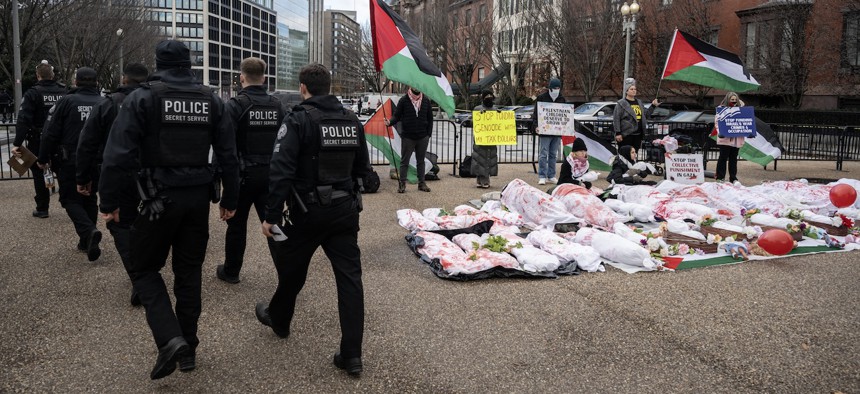
Members of the Secret Service walk past anti-war protesters demonstrating in support of Palestinians in Gaza, holding signs and waving flags near the White House on Dec. 11, 2023. ANDREW CABALLERO-REYNOLDS/AFP via Getty Images
Secret Service overtime pay locked in through 2028
The House passed legislation Monday to extend overtime pay authority for agents providing protective services through the next presidential election cycle after it was slated to lapse last month.
With the presidential race heating up, Secret Service agents will again be able to request overtime pay while providing protective services to the chief executive, leading candidates and others.
The House passed the Overtime Pay for Protective Services Act in a 379-20 vote Monday, extending the overtime authority retroactively from Dec. 31, 2023 through 2028, after the Senate previously passed the bill in December.
The bill, which builds on past funding legislation from 2016, strictly authorizes overtime funding for the Secret Service’s protective operations — which include safeguarding the president; vice president; their families; former presidents, their spouses and children under the age of 16; foreign heads of state and their spouses visit the U.S.; major presidential and vice presidential candidates and their spouses; and designated National Special Security Events.
How much overtime that will entail in what is anticipated to be a hotly contested election remains to be seen. According to the Congressional Budget Office, the Secret Service budgeted $23 million in additional premium pay for 2016 and 2017.
However, the Secret Service’s fiscal 2024 budget request estimates that overtime cost drivers for the presidential election alone are set to top out at $31.8 million for overtime and protective travel, alongside another $5.6 million to help secure National Special Security Events, up from a combined $5.4 million in fiscal 2023, a non-election year.
Those drivers include protection of the conventions, campaign events and debates, as well as “continued procurement of specialized protective equipment and supplies; and shipping costs to move protective equipment and supplies around the country based on campaign travel schedules associated with the 2024 presidential campaign.”
The Secret Service increased its request for overtime above the employee pay cap by $15 million in fiscal 2024 in anticipation of the added protection costs, noting that protection for major candidates typically begins in the winter before the election and varies through the year.
“There have been some outliers that are difficult to predict and plan for; President Obama, for example, began receiving protection in May of 2007 and President Trump began receiving protection in November of 2015,” the budget request said. “Based on historical experience, the Secret Service is projecting that in campaign 2024, there may be upwards of six candidates receiving protection for an estimated total of 1,252 campaign days.”
But while the overtime authorization will soon be extended, once the president signs it into law, the Secret Service’s full appropriation is awaiting an anticipated budget deal on Capitol Hill following three, and counting, continuing resolutions.







